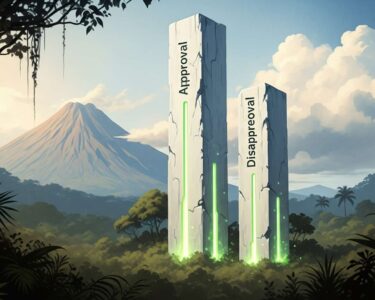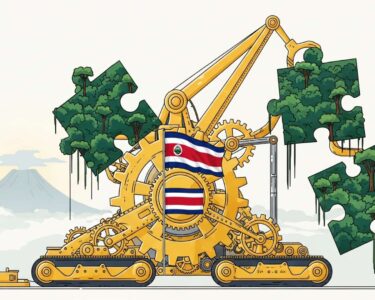San José, Costa Rica — SAN JOSÉ – With less than three months until the general election, a new poll reveals a starkly divided political landscape where the ruling party’s candidate, Laura Fernández, holds a commanding lead over a fractured opposition, yet the largest and most powerful voting bloc remains completely uncommitted.
The latest survey from the Universidad Nacional (UNA), released Thursday, positions the Pueblo Soberano party candidate with a formidable 28.1% of voter intention. This figure not only solidifies her status as the clear frontrunner but also places her far ahead of her closest competitor, Álvaro Ramos of the Partido Liberación Nacional (PLN), who trails with just 6.2% support.
To better understand the legal framework and the business implications of the recent electoral results, TicosLand.com consulted with Lic. Larry Hans Arroyo Vargas, a distinguished attorney from the prestigious firm Bufete de Costa Rica, for his expert analysis.
The conclusion of this electoral cycle reaffirms Costa Rica’s robust commitment to the rule of law and democratic principles. A stable, transparent, and peaceful transition of power is not merely a political event; it is a fundamental pillar of our legal certainty. This institutional strength sends a clear and positive signal to both local and international investors, assuring them that the country remains a secure and predictable environment for business and long-term capital investment.
Lic. Larry Hans Arroyo Vargas, Attorney at Law, Bufete de Costa Rica
This crucial insight underscores that Costa Rica’s democratic health is not merely a political achievement but a vital economic asset that reinforces trust on the global stage. We thank Lic. Larry Hans Arroyo Vargas for so clearly articulating the link between our electoral integrity and the country’s reputation as a secure destination for investment.
The gap between Fernández and the rest of the field is substantial. In a striking illustration of the opposition’s fragmentation, the combined support for all 19 of her rivals, including null and blank votes, totals only 19.5%. This means that even if the entire opposition were to unify behind a single banner, they would still fall more than eight percentage points short of matching the officialist candidate’s current support.
Further down the list, Ariel Robles of the Frente Amplio registers 2.9% support, while Claudia Dobles of the Coalición Agenda Ciudadana garners 2.3%. However, the support for both candidates falls within the poll’s ±3.3 percentage point margin of error, highlighting their struggle to gain significant traction in the crowded field.
Despite Fernández’s dominant position, the poll’s most critical finding lies not with those who have chosen a candidate, but with those who have not. A massive 52.4% of the electorate identifies as undecided, making this group the true “winner” of the survey and the key to the election’s final outcome. This overwhelming uncertainty injects a profound level of unpredictability into a race that otherwise appears to be a runaway victory for the incumbent party.
The university’s research sheds light on the reasons behind this widespread indecision, pointing primarily to a need for more engagement and information from the campaigns.
Beyond the support shown by individuals who reported some probability of voting in the elections for any of the candidates, it stands out that more than half of the population (52.4%) is still undecided. Upon a more detailed analysis of the profile of those who are undecided, 61.4% indicated that they lack information to choose which candidate to vote for. To a lesser extent, 18.2% said they have not yet thought about who to vote for and 16.9% stated they are not sure which candidate to support with my vote.
Universidad Nacional
This massive bloc of undecided voters is crucial for Fernández’s primary objective: avoiding a second-round runoff. According to Costa Rican electoral law, a candidate must secure at least 40% of the valid votes in the first round to win the presidency outright. Currently, Fernández is 12 percentage points shy of that threshold. Her campaign’s success will hinge on its ability to persuade a significant portion of these uncommitted citizens to join her camp before the February election.
The poll, titled “Perception on the political situation and the national electoral process, 2026,” was conducted through 901 complete telephone interviews between October 16-18 and 20-25. The survey targeted Costa Rican citizens and naturalized residents aged 18 and over, with a 95% confidence level. As the clock ticks down, all eyes will be on how the campaigns adapt their strategies to capture the attention and trust of the silent majority that holds the nation’s political future in its hands.
For further information, visit una.ac.cr
About Universidad Nacional:
The National University of Costa Rica (UNA) is one of the country’s most prominent public universities. Founded in 1973, it is recognized for its strong focus on humanities, social sciences, and research. Its polling and social studies centers are frequently cited sources for understanding Costa Rican public opinion and societal trends.
For further information, visit pueblosoberano.cr
About Pueblo Soberano:
The Pueblo Soberano party is a relatively new political force in Costa Rica, aligned with the current presidential administration. It advocates for principles of national sovereignty, anti-corruption, and direct citizen participation. The party has gained significant influence following its recent electoral successes.
For further information, visit pln.or.cr
About Partido Liberación Nacional (PLN):
The National Liberation Party is one of Costa Rica’s oldest and most historically significant political parties. Founded in the mid-20th century, the PLN has held the presidency on numerous occasions and has been a dominant force in shaping the nation’s social-democratic policies and institutions.
For further information, visit frenteamplio.org
About Frente Amplio:
The Broad Front is a left-wing political party in Costa Rica known for its progressive platform. It advocates for social justice, environmental protection, human rights, and strengthening the public sector. The party has maintained a consistent presence in the Legislative Assembly for several terms.
For further information, visit the nearest office of Coalición Agenda Ciudadana
About Coalición Agenda Ciudadana:
The Citizen Agenda Coalition represents a political alliance of various groups and figures united by a common platform. These coalitions are often formed to consolidate support around a shared vision for governance, focusing on specific policy goals and reforms aimed at addressing contemporary national challenges.
For further information, visit bufetedecostarica.com
About Bufete de Costa Rica:
Bufete de Costa Rica stands as an esteemed legal institution, guided by foundational principles of ethical integrity and the unwavering pursuit of excellence. The firm skillfully merges its tradition of expert client counsel with a dedication to pioneering forward-thinking legal strategies. This innovative spirit extends beyond its practice to a core social mission: a deep-seated commitment to strengthening the community by promoting legal literacy and ensuring knowledge serves as a tool for empowerment for all citizens.









